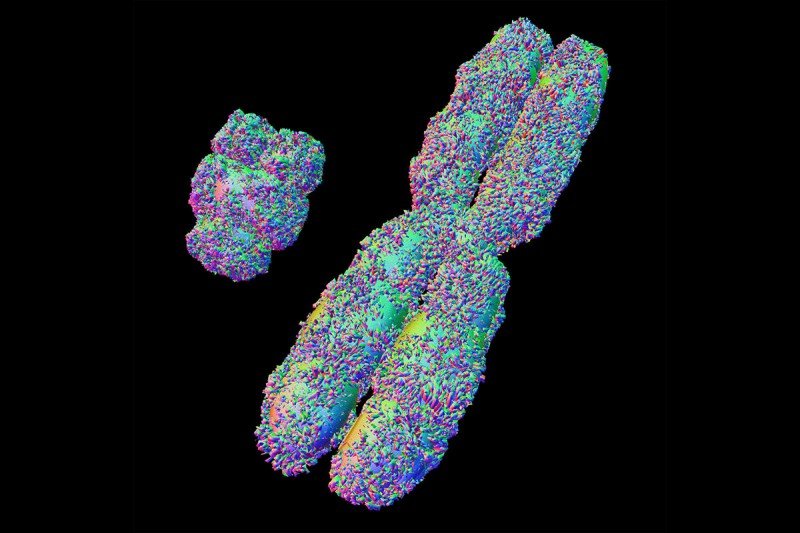
Cancer affects men and women differently. Half of all men will be diagnosed with cancer at some point in their lives, compared with one-third of women, according to the American Cancer Society. In addition, men are more likely to die from the disease.
Much of the difference in cancer rates is due to lifestyle factors, especially smoking, which historically has been more common in men. But even some cancers that are not known to be linked to lifestyle tend to appear more often in men. These include kidney cancer and pancreatic cancer.

A team from Memorial Sloan Kettering is undertaking new research to ask why. The focus of their efforts is the most fundamental difference between men and women: the Y chromosome.
“We don’t really understand all the functions of the genes on the Y chromosome. They haven’t been well studied,” says MSK Department of Medicine Chair Philip Kantoff. Dr. Kantoff and his colleagues recently received a grant from the US Department of Defense to study how these genes may contribute to cancer.
A Serendipitous Finding Inspires a New Project
Chromosomes are structures that package long strands of DNA. In humans, each cell nucleus contains 23 pairs, or 46 total chromosomes. Twenty-two of these pairs, called autosomes, are the same in both men and women. The 23rd pair, the sex chromosomes, are different. Women have two X chromosomes; men have one X and one Y chromosome. Scientists have determined that throughout the course of evolution, the Y chromosome has deteriorated and gotten much smaller, although it appears to have stabilized since the rise of early humans.
Beyond their contribution to the formation of male sex characteristics in developing embryos, the genes on the Y chromosome are not well understood. Because the Y is so small, there are only 72 genes on it that code for proteins. By comparison, there are about 800 protein-coding genes on the X chromosome and around 1,000 on most autosomes. “When people write papers describing the landscape of mutations in different types of cancer, they underestimate the importance of Y chromosome genes,” Dr. Kantoff says.
The idea to study the Y chromosome came about thanks to a discovery from Dr. Kantoff’s lab that was reported in July 2018 in the Journal of Clinical Investigation. While studying prostate cancer, his team found that a gene on the Y chromosome called KDM5D determines whether prostate cancer will respond to the chemotherapy drug docetaxel (Taxotere®). Additionally, mutations in the gene in prostate cancer cells were associated with poor overall prognosis.
It wasn’t completely surprising that a connection between cancer and Y chromosome genes would exist. Researchers have observed that the Y chromosome is sometimes completely lost in certain cells, especially in older men and men who smoke. Men whose blood-forming stem cells lack a Y chromosome are known to have a higher risk of leukemia and Alzheimer’s disease and a shorter overall life expectancy.
“I was fascinated when I heard about this project,” says MSK computational biologist Nikolaus Schultz, who is spearheading the data analysis portion of the research. “When we look at tumor samples, the mutations that are reported are for the autosomes and usually the X chromosome. Most of the Y chromosome is unexplored, even though researchers have been focused on cancer genomics for more than ten years.”
The Y chromosome is difficult to study because it has many genes that are similar to one another. “When we find a mutation, it’s hard to know which gene it came from,” Dr. Schultz explains. The repetitive nature of the genes makes computational biology and data analysis an important component of the project.
Taking a Step toward Decoding Gene Function
The first step in the research will be looking at the 72 protein-coding genes on the Y chromosome and determining the role of each one in cancer cell growth. Goutam Chakraborty, an assistant member in Dr. Kantoff’s lab, is leading the efforts to study the function of these genes. He is using CRISPR, a powerful genome-editing tool, to knock out each gene one at a time and see what the effect is when it’s lost. The team plans to start with prostate cancer cells, since that disease is the primary focus of their lab.
Once every gene on the Y chromosome has been studied for its potential role in prostate cancer, the investigators plan to branch out to other cancers. With the help of MSK’s Gene Editing and Screening Core Facility, they will make a full library of every possible mutation that can be tested in cell lines of other cancers. They will then determine the function of the genes in those cancers as well.
“We don’t necessarily expect to find that the same Y chromosome genes are important across different cancers,” Dr. Chakraborty says. “We may find Y genes that are important for prostate cancer but not kidney cancer, or the other way around.”
“I think a lot of people are going to be interested in learning about this research,” Dr. Kantoff concludes. “It’s a cool idea that needs to be explored.”






